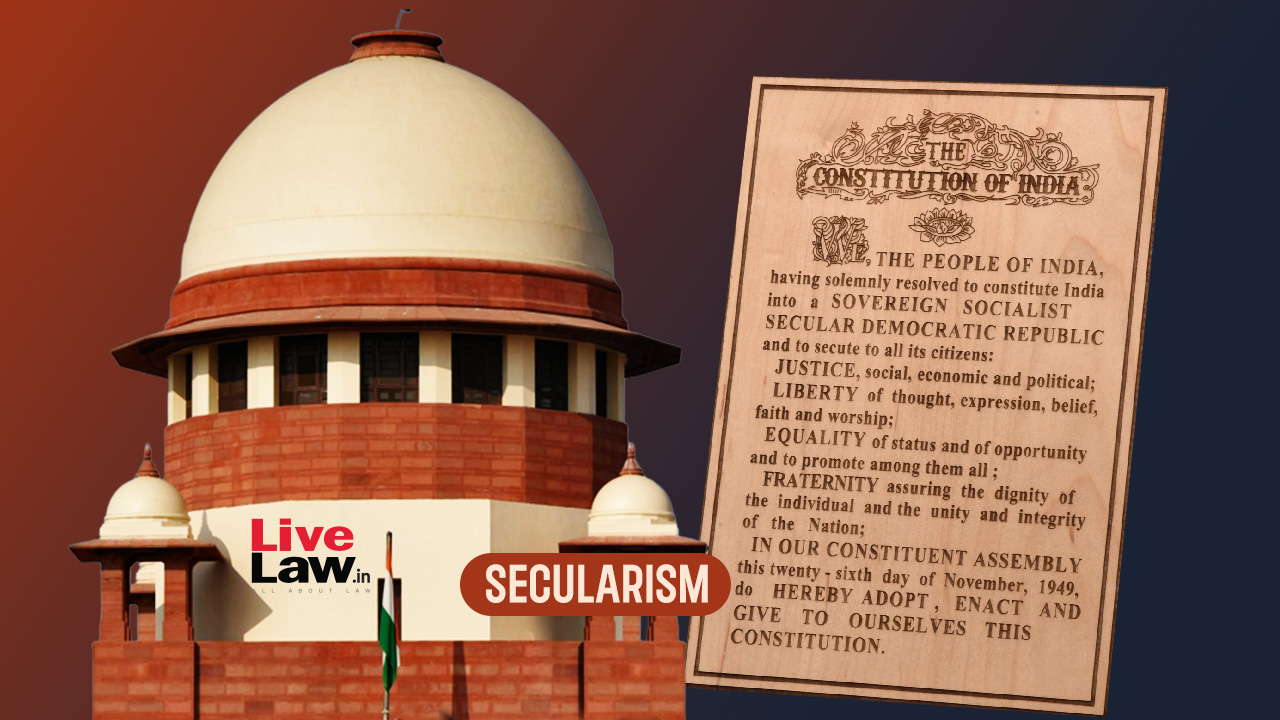 |
|
The Supreme Court of India recently delivered a landmark judgment concerning the secular nature of the Indian Constitution. Dismissing petitions challenging the inclusion of 'secular' and 'socialist' in the Preamble through the 42nd Amendment of 1976, the court declared that secularism, far from being a later addition, was inherently present within the original Constitution's framework. This assertion rests on the interpretation of the Preamble's foundational principles, even before the explicit inclusion of the term 'secular'. The court meticulously examined the original tenets of the Preamble, emphasizing the inherent secular ethos embedded within its provisions. Key phrases like 'equality of status and opportunity', 'fraternity ensuring individual dignity', and the guarantees of 'justice—social, economic, political—and liberty of thought, expression, belief, faith, and worship' were highlighted as demonstrably reflecting a commitment to religious neutrality and the equal treatment of all citizens irrespective of their religious affiliations. This interpretation emphasizes the implicit commitment to secular values present in the original design of the Constitution, suggesting that the 42nd Amendment served more as a formal codification of a pre-existing principle rather than a fundamental alteration of the Constitution's character.
The Court further reinforced its position by pointing to specific articles within the Constitution that explicitly guarantee religious freedom and equality. Articles 14, 15, and 16, prohibiting discrimination on religious grounds and ensuring equal protection of laws and opportunities, were cited as concrete evidence of the Constitution's inherent secular character. The court delved into the provisions of Articles 25, 26, 29, 30, and 44, demonstrating how these articles collectively safeguard religious freedoms, minority rights, and cultural diversity, all while acknowledging the state's right to regulate secular activities associated with religious practices and its aspiration towards a uniform civil code (Article 44). This detailed analysis aimed to demonstrate that the constitutional framework, from its inception, included mechanisms for protecting religious freedoms alongside the state's capacity to maintain social order and unity. The court acknowledged that India's understanding of secularism has evolved over time, reflecting the country's diverse religious landscape and historical experience. The current interpretation, according to the Court, is one where the state remains neutral, neither endorsing nor penalizing any particular faith. This evolved understanding, however, does not contradict the original principles but rather demonstrates a maturing of constitutional interpretation in light of India's socio-political evolution.
The Supreme Court's judgment strategically referenced several landmark cases that established secularism as a fundamental and integral aspect of the Indian Constitution. The cases of Kesavananda Bharati v. State of Kerala and S R Bommai vs Union of India were particularly significant, as they previously reinforced the status of secularism as a basic feature of the Constitution, a component essential to its very existence. The court also cited R C Poudyal v. Union of India, which clarified that even before the explicit inclusion of 'secular' in the Preamble, the inherent commitment to religious equality and non-discrimination constituted the essence of secularism in India. The strategic use of these precedents solidified the court's argument by demonstrating a consistent judicial interpretation across decades, affirming the deeply rooted nature of secularism within India’s constitutional fabric. The judgment therefore carries significant weight, not only in resolving the specific legal challenge but also in reaffirming a core principle of Indian identity and governance. It clarifies the continuous and consistent commitment to secularism embedded within the constitution, from its inception to its modern interpretation, despite variations in terminology or articulation over time. This judicial reinforcement of secularism has significant implications for navigating complex issues related to religious freedom, minority rights, and the overall governance of a diverse nation.
The Supreme Court's decision is not merely a legal pronouncement but a statement about the fundamental identity and values of India. It underscores the importance of constitutional principles that promote inclusivity, religious harmony, and equal opportunity for all citizens regardless of their religious beliefs. The detailed analysis of the Preamble's original tenets and relevant constitutional articles demonstrates a comprehensive and nuanced approach to understanding the evolution of secularism within the Indian context. This decision will undoubtedly have long-lasting consequences for legal debates related to religious freedom, state neutrality, and the interpretation of the Constitution. Furthermore, it serves as a powerful statement reaffirming the commitment to secular values and their crucial role in the functioning of a pluralistic democracy. The Court's deliberate linking of past judicial pronouncements with its current judgment emphasizes the continuity of this commitment, ensuring consistency and predictability within the Indian legal system. This thorough and well-reasoned approach reinforces the credibility of the judgment and its potential impact on future legal discourse and policy-making concerning secularism in India.
